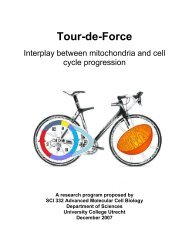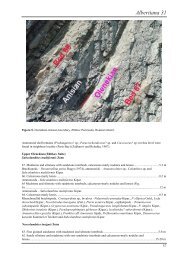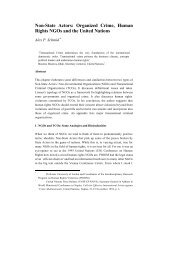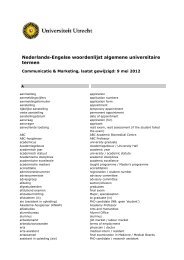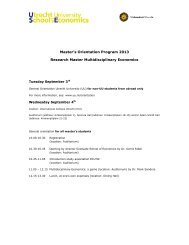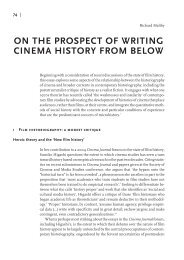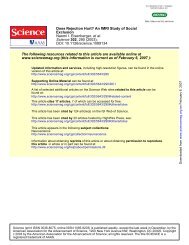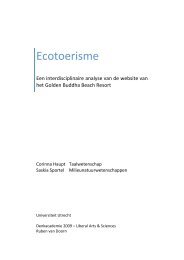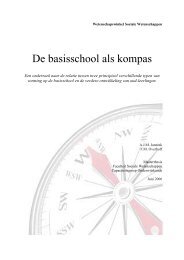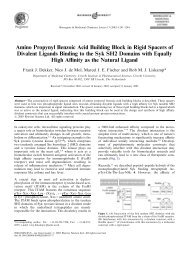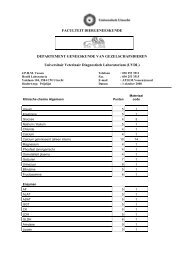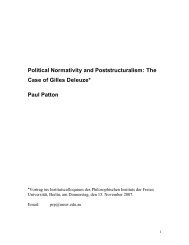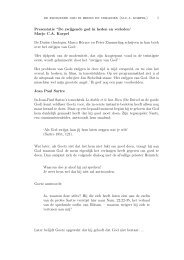Review of the Research Institute for History and - Universiteit Utrecht
Review of the Research Institute for History and - Universiteit Utrecht
Review of the Research Institute for History and - Universiteit Utrecht
Create successful ePaper yourself
Turn your PDF publications into a flip-book with our unique Google optimized e-Paper software.
A. Documentation regarding <strong>the</strong> level <strong>of</strong> <strong>the</strong> research programme<br />
Title <strong>of</strong> <strong>the</strong> programme:<br />
Gender Studies<br />
Starting date:<br />
1994<br />
<strong>Research</strong> erea <strong>and</strong> mission:<br />
Gender <strong>and</strong> ethnicity<br />
Programme leader:<br />
Pr<strong>of</strong>. R. Braidotti<br />
Affi liations outside <strong>the</strong> institute (e.g. research school) <strong>and</strong> o<strong>the</strong>r cooperations <strong>and</strong><br />
relations with national <strong>and</strong> international research groups:<br />
Ne<strong>the</strong>rl<strong>and</strong>s <strong>Research</strong> School <strong>for</strong> Women’s Studies<br />
International Offi ce Women’s Studies<br />
A 1. Leadership<br />
With 6,44 fte this is one <strong>of</strong> <strong>the</strong> smaller groups within <strong>the</strong> OGC. It consists <strong>of</strong> 3 full<br />
pr<strong>of</strong>essors, 1 associate pr<strong>of</strong>essor, 2 Postdocs, <strong>and</strong> 6 PhD-students. Gender Studies is<br />
a new fi eld <strong>of</strong> academic inquiry within <strong>the</strong> Humanities <strong>and</strong> Social Sciences. From<br />
<strong>the</strong> very start, Gender Studies has been international <strong>and</strong> interdisciplinary in orientation.<br />
Because <strong>of</strong> its recent origin, Women’s Studies was not so much shaped<br />
by <strong>the</strong> traditions <strong>of</strong> <strong>the</strong> nineteenth century, but ra<strong>the</strong>r, during <strong>the</strong> 1980s, heavily<br />
infl uenced by structuralism <strong>and</strong> post-modernism. Recently, under <strong>the</strong> infl uence <strong>of</strong><br />
post-colonial studies, Gender Studies has become closely connected with <strong>the</strong> study<br />
<strong>of</strong> ethnicity.<br />
These developments in <strong>the</strong> fi eld as a whole are clearly visible in <strong>the</strong> development<br />
<strong>of</strong> <strong>the</strong> <strong>Utrecht</strong> group that has in its own right helped shape <strong>the</strong> course <strong>of</strong> <strong>the</strong><br />
fi eld. Since <strong>the</strong> appointment <strong>of</strong> pr<strong>of</strong>. Rosi Braidotti to <strong>the</strong> chair in Comparative<br />
Women’s Studies in 1986, <strong>the</strong> group has been self-consciously international en<br />
interdisciplinary. Particularly history <strong>and</strong> literary studies have been prominently<br />
represented in <strong>the</strong> group. The group values team work <strong>and</strong> regular interaction<br />
between members. The group has a coordinating team that meets every six weeks,<br />
to discuss new initiatives. In <strong>the</strong> monthly workshop meetings faculty, PhDstudents<br />
<strong>and</strong> guest speakers from o<strong>the</strong>r Dutch <strong>and</strong> <strong>for</strong>eign universities meet to<br />
discuss papers. The group also regularly invites distinguished guest speakers <strong>for</strong><br />
lectures <strong>and</strong> master classes. Members <strong>of</strong> <strong>the</strong> group are encouraged to participate in<br />
inter national projects <strong>and</strong> networks.<br />
A 2. Strategy <strong>and</strong> policy<br />
The group is particularly engaged in <strong>the</strong> analysis <strong>of</strong>, <strong>and</strong> <strong>the</strong>oretical refl ection on<br />
processes <strong>of</strong> power, representation <strong>and</strong> signifi cation. Much <strong>of</strong> its work concerns<br />
<strong>the</strong> interaction between <strong>the</strong> symbolic <strong>and</strong> material manifestations <strong>of</strong> culture <strong>and</strong><br />
identity, two spheres usually treated as distinct. The <strong>the</strong>oretical framework <strong>of</strong> <strong>the</strong><br />
programme is <strong>for</strong>med by two research traditions: on <strong>the</strong> one h<strong>and</strong> an American<br />
tradition <strong>of</strong> critical refl ection on issues <strong>of</strong> race <strong>and</strong> gender, <strong>and</strong> on <strong>the</strong> o<strong>the</strong>r <strong>the</strong><br />
post-colonial feminist <strong>the</strong>ories that were developed in <strong>the</strong> study <strong>of</strong> early colonies<br />
<strong>and</strong> metropoles. The programme aims to contribute new ideas to <strong>the</strong> study <strong>of</strong> <strong>the</strong><br />
interaction between gender <strong>and</strong> ethnicity that have sprouted from <strong>the</strong>se two<br />
traditions. Concentration on <strong>the</strong> cultural practices developed in Europe, as a post-<br />
OGC Gender Studies<br />
334



